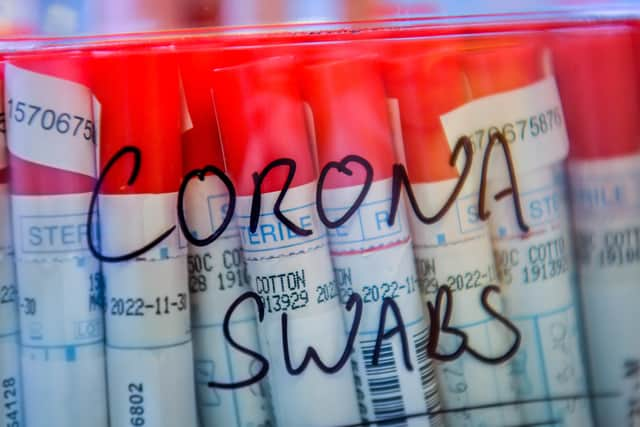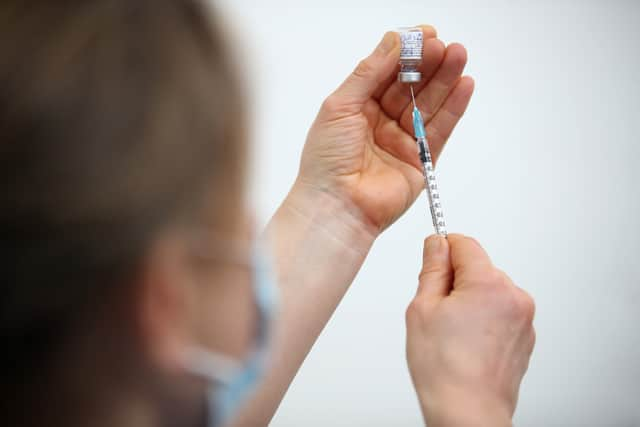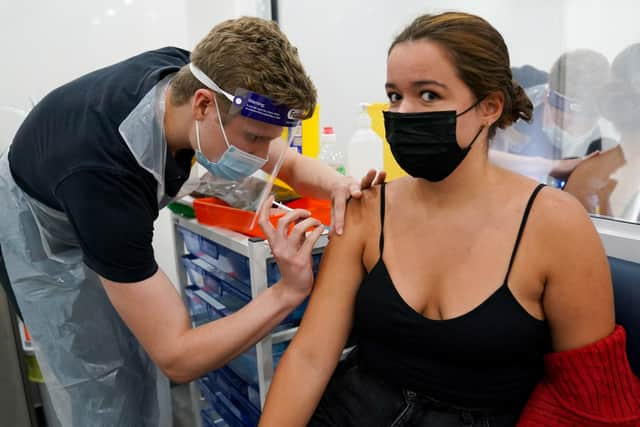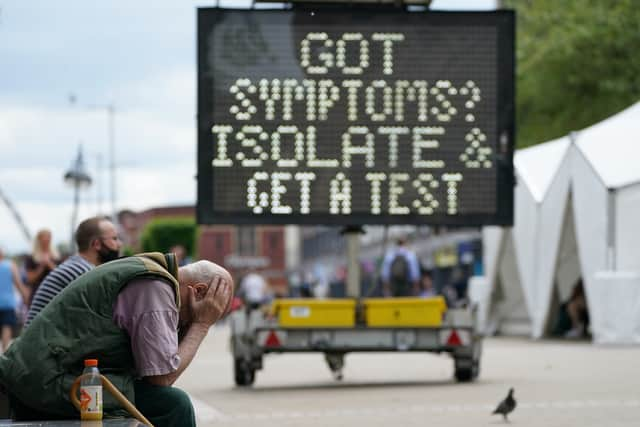NI hopes for herd immunity wrecked by Delta variant say experts
and live on Freeview channel 276
Please scroll down for more on this story.
LIVE UPDATES: Coronavirus NI - Hopes of NI and rest of UK reaching herd immunity wrecked by Delta variant say experts
Key Events
- Public Health Agency issue Covid-19 warning
- Hopes of NI and rest of UK reaching herd immunity wrecked by Delta variant say experts
- Older teenagers seriously ill with Covid-19 ‘led to jabs rollout extension’
- Uncertainty over NI's vaccine booster initiative due to begin next month
Hopes of NI and rest of UK reaching herd immunity wrecked by Delta variant say experts


Herd immunity in Northern Ireland or, for that matter, the rest of the United Kingdom is “not a possibility” with the dominant Delta variant of coronavirus, an expert has said - writes Aine Fox, PA.
Professor Sir Andrew Pollard, director of the Oxford Vaccine Group, referred to the idea as “mythical” and warned that a vaccine programme should not be built around the idea of achieving it.
Herd immunity is when enough people become resistant to a disease – through vaccination or previous exposure – that it can no longer significantly spread among the rest of the population.
Sir Andrew told a session of the All-Party Parliamentary Group on Coronavirus (APPG): “We know very clearly with coronavirus that this current variant, the Delta variant, will still infect people who have been vaccinated and that does mean that anyone who’s still unvaccinated, at some point, will meet the virus.”
He said while vaccines might “slow the process” of transmission down, they currently cannot stop the spread completely.
He added: “I think we are in a situation here with this current variant where herd immunity is not a possibility because it still infects vaccinated individuals.”
He predicted that the next thing may be “a variant which is perhaps even better at transmitting in vaccinated populations”.
He added: “So, that’s even more of a reason not to be making a vaccine programme around herd immunity.”
The parliamentary group’s chairwoman, Liberal Democrat MP Layla Moran, called on the Government to “re-evaluate their approach” and put together a “new and comprehensive” plan to mitigate the risks from new variants.
She said: “The worrying evidence we heard today suggests that given the emergence of new variants, including vaccine-resistant ones, achieving herd immunity is just a pipe dream.
“The Government’s plan to learn to live with Covid cannot become a byword for abdicating responsibility to the most vulnerable.
“Ministers must re-evaluate their approach and come up with a new and comprehensive, long-term plan to mitigate the risks posed by Covid and new variants.
“That must include showing moral leadership and stepping up efforts to vaccinate the world.”
Sir Andrew said while there might be “bumpiness” in the next six months, there is also likely to be “increasing confidence” with the UK’s situation with the virus.
He told the APPG: “I think this next six months is a really important consolidation phase and in that shift from the epidemic to the endemic, which is the ‘living with Covid’.
“That doesn’t mean that we live with it and put up with it – we still have to manage those cases of patients who become unwell with it.”
Professor Paul Hunter, from the University of East Anglia, said the way infections are reported might need to change as Covid-19 becomes endemic so that people are not “frightening ourselves” with high numbers “that actually don’t translate into disease burden”.
He told the the session: “I think we need to start moving away from just reporting infections, just reporting positive cases admitted to hospital, to actually start reporting the number of people who are ill because of Covid, those positives that are symptomatic.
“We need to be moving towards reporting hospital admissions that are admitted because of Covid, not because they just happen to be positive and they’re being admitted for something else.”
He said the distinction in someone being ill with Covid or because of Covid is not always an easy one to make for clinicians, but added: “I think we’ve got to start moving to that, otherwise as infection becomes endemic we are going to be frightening ourselves with very high numbers that actually don’t translate into disease burden.”
Uncertainty over NI's vaccine booster initiative due to begin next month


A wider Covid-19 vaccination booster campaign for Northern Ireland and the rest of the United Kingdom still hangs in the balance even though it is due to start in less than four weeks - writes Ella Pickover, PA Health Correspondent .
Experts said they are still assessing data before they confirm whether all over-50s and the clinically vulnerable will need a third jab.
They confirmed a booster will “quite likely” be needed for a small number of people who are immunosuppressed.
There are plans for around 30 million people to receive a third Covid-19 jab alongside a flu vaccine, with the programme due to start on September 6.
But the expert panel that advises Northern Ireland and the rest of United Kingdom – the Joint Committee on Vaccination and Immunisation (JCVI) – is still assessing hospital admissions data and blood test samples before they approve the programme.
On Tuesday Health Secretary Sajid Javid said preparations for the booster campaign were ongoing but ministers were awaiting guidance from the clinical experts.
It has been reported that ministers are already planning a 2022 booster campaign after securing 32 million Pfizer doses for autumn next year.
The Times reported that the doses cost £1 billion.
The Department of Health and Social Care (DHSC) said: “We have secured access to more than 500 million doses of Covid-19 vaccines and we are confident our supply will support potential booster programmes in the future.”
Pfizer said in a statement: “We are unable to comment on the specifics of any supply agreement with the UK. Through all government agreements, Pfizer and BioNTech are using a tiered pricing formula, based on factors including volume and delivery dates, which ensures agreements are bespoke to the needs of each vaccination programme we support.”
Asked about a booster campaign for this year, Adam Finn, professor of paediatrics at the University of Bristol, who sits on the JCVI, told BBC Breakfast: “We’ve been asked to advise as to who might receive a booster if it proves necessary to give boosters.
“I think it’s becoming quite clear that there are a small group of people whose immune responses to the first two doses are likely to be inadequate – people who’ve got immunosuppression of one kind or another, perhaps because they’ve got immunodeficiency or they’ve been receiving treatment for cancer or bone marrow transplants or organ transplants, that kind of thing.
“I think it’s quite likely we’ll be advising on a third dose for some of those groups.
“A broader booster programme is still uncertain – we’ve laid out potential plans so that the logistics of that can be put together, alongside the flu vaccine programme.
“We need to review evidence as to whether people who receive vaccines early on in the programme are in any serious risk of getting serious disease and whether the protection they’ve got from those first two doses is still strong. We clearly don’t want to be giving vaccines to people that don’t need them.”
He said it was difficult to say when the JCVI would have more data on whether a wider booster campaign was needed, but experts would be examining hospital admissions and blood tests.
Danny Altmann, professor of immunology at Imperial College London, told Times Radio: “For a vulnerable person whose immunity is suboptimal, any boosting is better than none, and some of the data is quite promising on getting people back up into that protective zone.”
On Tuesday, Professor Sir Andrew Pollard, director of the Oxford Vaccine Group, told the All Party Parliamentary Group on Coronavirus that any waning of protection provided by vaccines would be “gradual” and would be picked up quickly through UK surveillance systems, adding: “There isn’t any reason at this moment to panic.”
Sir Andrew also suggested the concept of herd immunity was “not a possibility” due to the more transmissible Delta variant of the virus.
He referred to the idea as “mythical” and warned that a vaccine programme should not be built around the idea of achieving it.
“We know very clearly with coronavirus that this current variant, the Delta variant, will still infect people who have been vaccinated and that does mean that anyone who’s still unvaccinated, at some point, will meet the virus,” he told the parliamentarians.
A Government scientific adviser said Covid-19 is unlikely to be eradicated but the “nature of the virus” meant it would become a seasonal infection.
Professor Andrew Hayward, of University College London’s Institute of Epidemiology and Health Care and the New and Emerging Respiratory Virus Threats Advisory Group, told BBC Radio 4’s Today programme that Covid would probably continue to mutate, meaning true herd immunity is unlikely.
He said: “I think the nature of this infection and the nature of the vaccines is such that the level of immunity that is achieved is not enough to consider that.
“If someone could come up with a vaccine that was not only 95% protective against severe disease but 95% protective against infection then, yes, we would stand a chance of eradicating it.
“I think it is a pretty distant prospect and we need to get used to the concept that this will become what we call an endemic disease rather than a pandemic disease.
“A disease that is with us all the time – probably transmits seasonally a bit like influenza where we see winter outbreaks.”
Prof Altmann said new variants could mean vaccine immunity may never overcome the virus completely.
Asked whether coronavirus could “die away” once enough people have antibodies through having caught the virus or vaccination, he said: “That’s still kind of true.
“More vaccination means more people carrying antibodies means fewer susceptible people, which means fewer lungs for the virus to be in, which means less pandemic.
“So it hasn’t all gone out of the window. But nobody said this virus had to be simple.
“There’s Delta at the moment, there may well be other worse ones coming round the curve, and they impact the effectiveness of the vaccines and change their calculations.”
He added: “The experts are very divided and very bad at long-term crystal ball gazing, but the simple answer is, we’re still winning – it’s more complex than we thought, it’s a work in progress, but we’re still winning and the strategy still works.”
He was speaking after the DHSC said three in four adults had received both doses of a Covid-19 vaccine.
A total of 86,780,455 doses have been administered in the UK, with 47,091,889 people receiving a first dose (89%) and 39,688,566 having both doses (75%), the department said.
Older teenagers seriously ill with Covid-19 ‘led to jabs rollout extension’


The number of 16 and 17-year-olds becoming “seriously ill” with coronavirus informed the extension of the vaccination rollout to that age group, a member of the committee advising on jabs said.
Professor Adam Finn, who sits on the Joint Committee on Vaccination and Immunisation (JCVI) and is a professor of paediatrics at the University of Bristol, said there had been “a couple” of 17-year-olds in that area who needed intensive care in hospital in recent weeks.
He said while most young people will only have the virus in a mild form, the vaccines will be effective at preventing serious cases.
He told BBC Breakfast: “We’re going cautiously down through the ages now into childhood and it was clear that the number of cases and the number of young people in the age group – 16, 17 – that were getting seriously ill merited going forward with giving them just a first dose.”
He said the JCVI would advise “when and what” the second dose for that age group would be after assessing more data.
He added: “Most young people who get this virus get it mildly or even without any symptoms at all.
“But we are seeing cases in hospital even into this age group – we’ve had a couple of 17-year-olds here in Bristol admitted and needing intensive care over the course of the last four to six weeks – and so we are beginning to see a small number of serious cases.
“What we know for sure is that these vaccines are very effective at preventing those kind of serious cases from occurring.”
NHS England said nearly 16,000 people in the 16 to 17-year-old age group have already received their vaccine over the weekend, just days after JVCI guidance was updated.
Extending the jabs rollout further down to the 12 to 15-year-old age group has not been ruled out.
Danny Altmann, professor of immunology at Imperial College London, said he thinks doing so would be “a good thing”.
He told Times Radio the more unvaccinated people there are, the more lungs there are “for virus to percolate in, therefore it’s got to be a good thing to be vaccinating more children down through the age range”.
He said children who have the virus but do not have symptoms are “as dangerous to the spread as anybody else”.
He said: “From a medical scientific point of view, I’d say there’s nothing special about the virus in their lungs that can’t transmit through to their families, through to their schoolteachers, through to their colleagues.”
His comments came after Professor Sir Andrew Pollard said pupils who are not unwell should not have to isolate after being in contact with a Covid-19 case in the classroom.
Sir Andrew, who helped to create the Oxford/AstraZeneca vaccine and is a professor of paediatric infection at the University of Oxford, said that as long as children who are contacts are not ill, they should continue to be in school getting their education.
He told the All Party Parliamentary Group on Coronavirus on Tuesday: “Given that children have relatively mild infection compared to adults, apart from the exceptions who are largely going to be vaccinated in the current programme anyway, we probably should be moving to a situation where we’re clinically-driven.
“If someone is unwell, they should be tested, but for those contacts in the classroom, if they’re not unwell then it makes sense for them to be in school and being educated.”
The latest schools infection survey from the Office for National Statistics (ONS) showed that 0.27% of primary school pupils, 0.42% of secondary school pupils, and 0.27% of secondary school staff tested positive for coronavirus on the day of testing in June.
The ONS said its survey of 141 schools in England showed prevalence of infection among pupils sampled in school was consistently lower than prevalence among children in the wider community.
Professor Mark Woolhouse, professor of infectious disease epidemiology at the University of Edinburgh, said there is now a “wealth of evidence from around the world that schools are not the main driver of Covid-19 epidemics”.
He said the latest ONS survey “does not raise any immediate concerns about the re-opening of schools after the summer holidays” and added that the future inquiry into coronavirus should consider whether there was ever any need to close schools, saying he believes the epidemiological evidence suggests the answer may be no.
From August 16, children under the age of 18 will no longer be required to self-isolate if they are contacted by NHS Test and Trace as a close contact of a positive Covid-19 case.
Instead they will be informed they have been in close contact with a positive case and advised to take a PCR test.
Guidance issued at the end of term states that schools no longer need to perform contact tracing after being notified of a positive case.
Close contacts will now be identified through the Test and Trace programme.
Previously, children were required to isolate for 10 days if another pupil in their bubble – which could be an entire year group – tested positive for Covid-19.
Public Health Agency issue Covid-19 warning


The Public Health Agency (PHA) is urging people to continue to be vigilant for COVID-19 as rates in Northern Ireland remain higher than elsewhere in the United Kingdom.
Dr David Cromie, Consultant in Health Protection at the PHA, said: “It is vital that we all do as much as we can to stop the spread of COVID-19 infection. This is a serious disease and people are still dying or becoming very unwell.
“We need everyone to continue to follow the public health advice, get tested if they are symptomatic, and engage with the Contact Tracing Centre (CTS) if they test positive for COVID-19. If you haven’t yet received your COVID-19 vaccine, make arrangements to get it as soon as possible, as the vaccine will help prevent you from becoming seriously unwell with COVID-19, and also help keep vulnerable members of our community safe.
“Testing continues to be a vital tool in the fight against COVID-19. If you are symptomatic, please isolate and get tested, as there’s no way of knowing if you have COVID-19 if you don’t get tested, and it also means that we can’t alert your close contacts. Testing is available at various locations across Northern Ireland. The CTS is still phoning positive cases so expect to be contacted by one of the CTS team if you test positive. Please answer when we do call and, if you can, complete digital self-trace using the unique code that you will be sent, so we can alert your close contacts quickly and help stop the spread. We are asking everyone to familiarise themselves with the guidance for positive cases and save the CTS number – (028) 9536 8888 – to their phone so they know who it is trying to call them. We will leave a voice message where we can.
“It is also important to be open about your contacts and where you have been to help us stop transmission. Contact tracing will only ever be effective if the information provided to us is accurate and given in a timely manner, so please be open about who you’ve been in contact with – the information will be handled confidentially.
“We have been enhancing the service’s workforce every week, adding additional capacity to the operation in anticipation of case numbers growing, but we need people to work with us and share as much information as possible.
“There are also proactive steps we should all be taking to help avoid getting the virus in the first place – aside from the key steps of social distancing, handwashing and using a face covering where appropriate, vaccine uptake is an important means of securing protection against COVID-19 infection. The number of people who are eligible to get vaccinated continues to grow, so if you haven’t yet got your first dose, do so now.
“We understand that some may be nervous about getting the COVID-19 vaccine, as there is a lot of misinformation out there and it is very easy to be put off by stories that you read online. However, the vaccine is safe and it will help protect you from becoming seriously unwell if you are to contract COVID-19. If you have worries, talk through these concerns with a healthcare provider and get the facts on the vaccine from a reliable source such as the PHA.”
For information on testing, contact tracing and COVID-19 vaccination see www.pha.site/coronavirus
Comment Guidelines
National World encourages reader discussion on our stories. User feedback, insights and back-and-forth exchanges add a rich layer of context to reporting. Please review our Community Guidelines before commenting.